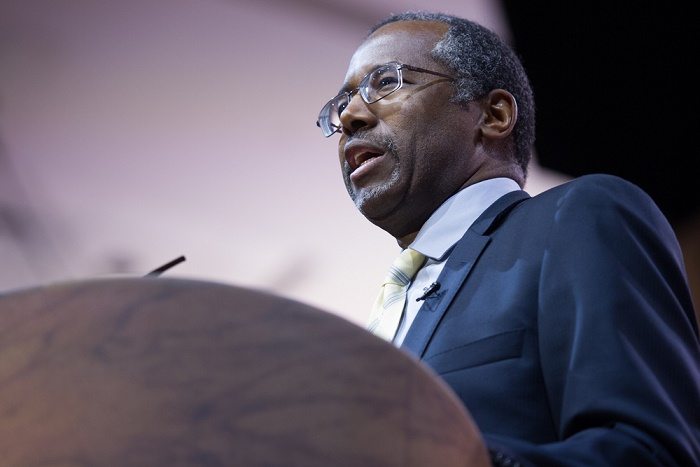Ben Carson Says His Own Fetal Tissue Research Was Justified
Carson told the Washington Post that his "intent" made his research acceptable, and that his opposition is to "killing babies and taking the tissue, that’s a very different thing than taking a dead specimen and keeping a record of it."

Dr. Ben Carson, the anti-abortion neurosurgeon currently vying with more than a dozen other candidates for the Republican presidential nomination, once conducted research on tissue collected from fetuses that had been aborted—and published a paper on his work in a peer-reviewed medical journal.
Carson’s research came to light on Wednesday, when OB-GYN and writer Dr. Jen Gunter unearthed Carson’s co-authored 1992 paper on colloid cysts in the journal Human Pathology. According to the paper, Carson and his colleagues examined tissue from two fetuses “aborted at the ninth and 17th week of gestation.”
The news of Carson’s research might not have been revelatory but for the fact that Carson has joined his GOP colleagues in condemning Planned Parenthood for its practice of legally collecting fetal tissue for research purposes, following the release of a series of heavily edited attack videos produced by an anti-choice group seeking to put the health-care provider out of business. His official campaign website calls the content of the videos, which show Planned Parenthood employees discussing fetal tissue donation programs, “barbaric.”
Carson told Fox News last month that using fetal tissue in medical research is a “disturbing” practice that shows the “callousness with which we are treating human life.” He specifically condemned the use of tissue from fetuses at 17 weeks’ gestation—the same gestational age of those which he worked with in the early ’90s:
“At 17 weeks, you’ve got a nice little nose and little fingers and hands and the heart’s beating. It can respond to environmental stimulus. How can you believe that that’s just an irrelevant mass of cells? That’s what they want you to believe, when in fact it is a human being,” said Carson.
The Washington Post picked up Gunter’s story and contacted Carson for comment. He told the newspaper that his “intent” made his research acceptable, and that his opposition is to “killing babies and taking the tissue, that’s a very different thing than taking a dead specimen and keeping a record of it.”
Carson told the Post that pathologists and researchers were not responsible for the origin of the tissue they worked with, and according to the newspaper, Carson said that he did not believe fetal tissue research was immoral or that it should be illegal. He also said research like his had medical and scientific value: “It’s one of the reasons why at the turn of the last century, the average age of death was 47. Now, the average age of death is 80. Using the information that you have is a smart thing, not a dumb thing.”
The comment comes a day after scientists told the Associated Press that fetal tissue is essential for some medical research, including Parkinson’s, AIDS, and Ebola. “If researchers are unable to work with fetal tissue, there is a huge list of diseases for which researchers would move much more slowly, rather than quickly, to find their cause and how they can be cured,” Stanford University spokeswoman Lisa Lapin said in an email to the AP.
Carson has been making modest gains in nationwide polling since his appearance at the first GOP presidential debate in early August, and he has said that he supports fully defunding Planned Parenthood because of their practice of providing fetal tissue for medical research.

